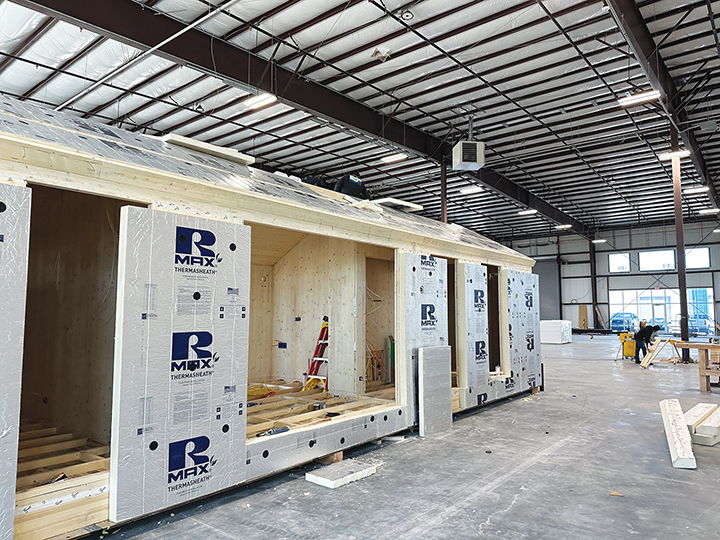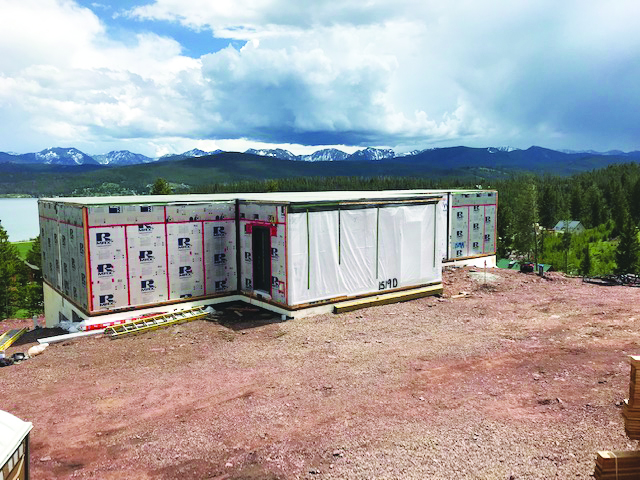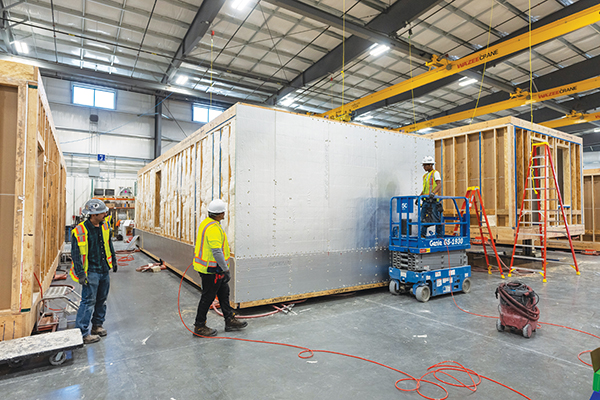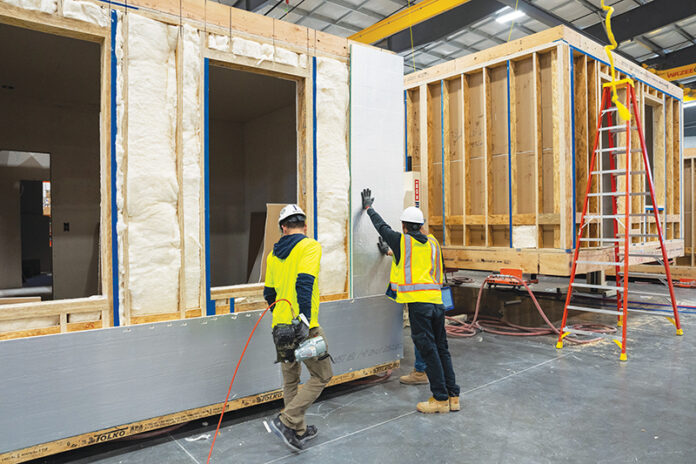This insulation board is critical if you’re building to high performance standards. But while it looks like a simple product, getting the most from it requires knowledge.
- When correctly installed and detailed, Polyisocyanurate insulation board (Polyiso) can manage all four control layers — water, air, thermal and vapor. This reduces worker trips around the house.
- It is a lightweight product that offers high R-values while also being moisture and fire resistant.
- Polyiso can be used for a variety of applications, in any architectural style. A knowledgeable manufacturer’s rep can help ensure optimal performance.
As the construction industry continues to evolve, modular has grown in acceptance and popularity, offering speed and cost-effectiveness. The controlled conditions of the modular factory also make it easier to outfit homes with features that make them more energy efficient and better able to meet the strictest energy code requirements.
When it comes to energy efficiency, an obvious, and crucial, feature is the insulation. While manufacturers have several types of insulation material to choose from, I would like to make the case here for including Polyisocyanurate as part of the insulation package.
Polyiso is versatile and effective, but it takes know-how and experience to get the most from this material. That’s why the manufacturer needs a collaborative relationship with a knowledgeable representative from the insulation manufacturer.
Understanding the Material
Polyiso is a closed-cell, rigid foam board insulation known for its high thermal efficiency. Comprised of a thermoset plastic foam usually sandwiched between aluminum or coated glass facers, it provides excellent thermal resistance, making it an ideal choice for regulating temperature in buildings. Typically used as an exterior continuous insulation, it can also be used to insulate roofs, floors and wall cavities.

Photo credit: Justin Wade at Stack Homes
Its lightweight nature and ease of installation make it well suited for modular construction. All four control layers (water, air, thermal and vapor) can be managed by Polyiso when installed continuously on the exterior and when paired with the appropriate seam, edge and fenestration treatments. Properly installed insulation will also reduce thermal bridging through framing materials by creating a thermal break between the sheathing and siding.
Modular Benefits
The benefits that Polyiso insulation offers to a manufacturer of modular homes are as follows:
Thermal efficiency. At an average of R6.5 per inch, Polyiso insulation boasts one of the highest R-values among commonly available insulation materials. This high thermal resistance helps reduce home energy consumption.
Versatility. Modular construction demands materials that can adapt to various design specifications and constraints. Polyiso’s versatility shines here, as it can be easily tailored in thickness to meet local energy code requirements and can be ordered in specialty lengths to meet specific size requirements in modules. It’s a seamless and efficient solution for a wide range of applications.
Weight reduction. The lightweight nature of Polyiso insulation makes installation easier and reduces the module weight, an important consideration for over-the-road shipping.
Space efficiency. Additionally, Polyiso can be ordered in a thin profile that eliminates the need for framing bucks around windows. Many window manufacturers allow their products to be installed directly over rigid insulation if the thickness is kept to a minimum.
Fire resistance. This material has excellent fire resistance. Many Polyiso products have a Class A fire rating and perform exceptionally well in UL (United Laboratories) and NFPA (National Fire Protection Association) rated assemblies.
Moisture resistance. Foil-faced Polyiso has a perm rating of .03 or less, which will help prevent the growth of mold and mildew. In modular construction, having a material that can withstand exposure to the elements during transportation, and during the set, is invaluable. Depending on the type of Polyiso chosen and the installation practices used, it can also serve as an air and water-resistive layer without the need for a full-coverage house wrap.

Photo credit: Julie Schuster at Stratford
Working With the Rep
While it’s clear that Polyiso offers numerous benefits, it takes specialized knowledge to fully realize those benefits on every project. A strong, collaborative relationship with the insulation representative will help the manufacturer install this material in the most efficient way, and use it to address specific challenges. Here’s how:
Tailored solutions. Insulation representatives possess in-depth knowledge of their products. A good representative will also seek to understand the modular manufacturer’s unique requirements, and to tailor solutions to meet those requirements.
For instance, a manufacturer in the Chicago, Ill. area worked with their insulation representative to find a Polyiso solution that met their exact R-value needs, rather than having to go up to the nearest stock thickness. This helped them to meet newer energy code requirements while avoiding transportation issues and without compromising their architectural design.
Technical expertise. Insulation representatives’ technical expertise means they can advise on the optimal insulation package, as well as the best application, for the project’s design and code compliance considerations. Many insulation manufacturers also have architects and building envelope consultants on staff to help with any questions about project performance.
This in-house expertise helps to ensure that the insulation will offer its best performance over the life of the building.
Continuous innovation. A collaborative relationship with an insulation representative helps to keep the manufacturer informed about the latest technological developments that apply to the insulation, in particular, and to the building envelope, in general.
As an example, one manufacturer was able to work with their insulation representative to change their exterior walls from a 3-layer assembly of weather resistant structural plywood, non-faced rigid insulation and full coverage house wrap to a 2-in-1 foil-faced Polyiso laminated to structural OSB made to the exact height of their modules. The latter can be installed in one pass, improving their timing on the exterior assembly.

Photo credit: Nick Chumchal at Rmax, a Sika company
Process optimization. Insulation representatives can provide valuable input about modular factories’ installation processes, helping them optimize their installation time. This may include recommendations on the best practices for handling and installing Polyiso, minimizing waste and streamlining the overall construction process.
Cost-effective solutions. By understanding code requirements, budget constraints and project goals, the representative can provide the manufacturer with insights on how to optimize the use of Polyiso without compromising performance.
One manufacturer of modular school buildings was able, after working with the insulation rep, to save on material and labor by reducing their ceiling insulation thickness by two inches. Going from multiple layers down to one and using shorter, more readily available fasteners also helped reduce the overall cost of the assembly.
Conclusion
In a recent LinkedIn article Jeremiah Osborn, Supply Chain Director at Fading West, made a relevant and accurate observation. “[Modular manufacturers] don’t need to settle for the outside sales rep/distribution status quo any longer, and many manufacturers are starting to realize this,” he wrote. “The best supplier partnerships are based on transparency, trust and mutual understanding. If you do not have this with critical suppliers don’t be afraid to start a conversation.”
The bottom line is that, in the fast-paced and quickly changing world of modular construction, insulation choice can play a pivotal role in ensuring the success of a project. Polyiso insulation is a stand-out solution because it offers more benefits than just its thermal performance. Polyiso’s true potential can only be unlocked through a collaborative partnership with the insulation representative.
This synergistic approach goes beyond a supplier-buyer relationship and can pave the way for tailor-made solutions that enhance process efficiency. It will ensure that projects exceed expectations in terms of performance, durability and environmental responsibility.
Steve Dubin is a Napa, California-based Business Development Manager for Rmax, a Sika Company. His area of focus is modular and offsite construction manufacturers. He can be reached on LinkedIn, or directly at [email protected].







